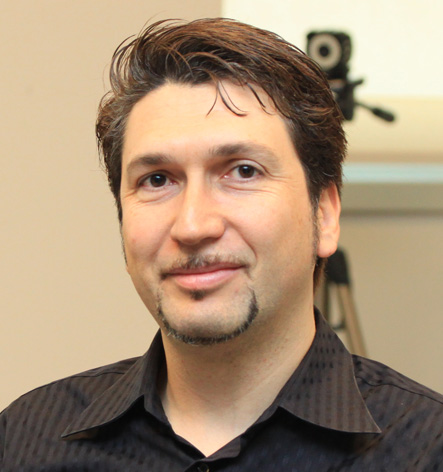
Thanks everyone for a great day!
Follow-up Events
Special Issue of the Journal of Intelligent & Robotic Systems on “Cognitive Robotics Systems: Concepts and Applications”
Future robotic systems need to reach a level of cognition that will allow them to understand and effectively operate in household and industrial environments, interact with humans, and adapt their actions to an ever growing range of situations. They are expected to be able to predict the perceptual changes that result as a consequence of human actions and replicate human activities, taking into consideration their own capabilities and limitations. This special issue draws inspiration from these themes, as addressed in the series of IROS workshops CAS-2012: “Cognitive Assistive Systems: Closing the Action-Perception Loop” and CRS-2013: “Cognitive Robotics Systems: Replicating Human Actions and Activities”.
This special issue aspires to elucidate advances in Cognitive Robotics Systems ranging from sensing through to learning and interaction, as well as their applications addressing domestic and industrial requirements. Emphasis will be given to closing the action-perception loop and reproducing human actions and activities.
Papers are solicited on concepts and applications related to cognitive robotics systems. Invited topics include, but are not be limited to:
- Robot imitation and learning by demonstration
- Symbiotic interaction between robots and humans
- Motion and activity capture
- Robot grasping, tools and object manipulation
- Active perception
- Visual perception and representation of 3D information
- Perceptual search and attention
- Motion planning and motion generation
- Adaptive and unsupervised activity learning
- Workflow monitoring and activity recognition
Important Dates:
Paper submission deadline: 30 April 2014
Notification to authors: 15 July 2014
Revised papers submission: 15 August 2014
Final acceptance: 15 October 2014
The special issue is open to high-quality contributions that fall within its scope. Papers should be up to 20 pages, prepared according to the “Instructions for Authors” of the Journal of Intelligent & Robotic Systems, and submitted here choosing “SI on Cognitive Robotics Systems: Concepts and Applications” as the article category. Please contact any of the guest editors for further information.
Guest Editors:
Lazaros Nalpantidis, Aalborg University, Denmark
Renaud Detry, University of Liege, Belgium
Dima Damen, University of Bristol, UK
Gabriele Bleser, DFKI, Germany
Maya Cakmak, University of Washington, USA
Mustafa Suphi Erden, EPFL, Switzerland
CRS 2013: Motivation
While current robotic systems are getting closer to repeating a carefully-coded action, they are still far from human’s versatility and adaptivity. Future robotic systems are expected to exhibit a level of cognition whereby they can replicate human activities, taking into consideration their own capabilities and limitations. In essence, robots are expected to be capable of understanding, generalizing, empathizing and replicating human behavior to achieve autonomous learning in the fullest sense of the word: understanding through sensing and encoding, generalizing by extracting higher-level understanding from low-level sensing data, empathizing by developing a sense of context-dependent interpretation, and replicating to replicate the observed behavior even in novel contexts.
Realizing cognitive robotics and systems (CRS) will require advances along the complete processing pipeline, from sensing through learning to acting. Sensing will need to capture and digest a person's complex activity and map it to the robot's framework; whilst learning will need to exploit knowledge in the form of stored data gained from observation of human actions. These are challenging tasks which are likely to require step changes in current state of the art capability.
In this workshop we aim at stimulating discussion towards addressing practical daily life and industrial problems by means of cognitive robotics concepts and technologies, specifically geared to encoding and regeneration of human action. We will bring together researchers from relevant disciplines to exchange ideas and results towards the goal of developing cognitive systems that can replicate human behaviors in an unsupervised manner. This will include those working in sensing, such as speech and vision, machine learning and AI, motion planning and estimation, with applications in domestic and industrial domains.
This workshop is the second in a series of workshops targeting aspects of cognitive systems. Last September, we organized an IROS workshop entitled Cognitive Assistive Systems: Closing the Action-Perception Loop.
Program
The workshop will take place on Sunday 3rd of November, 2013. The program of the day is as follows:
Session 1: 9:00–10:30 (1:30 hours)
- 9:00–9:35: Keynote
- A Look at the Attentive Needs of a Robot versus Human Perception
Prof. John Tsotsos – York University, Canada - 9:35–10:10: Keynote
- Contingency as a key for cognitive development: From self-other recognition to joint attention
Prof. Yukie Nagai – Osaka University, Japan - 10:10–10:25: Paper
- Robot learning by observing humans activities and modeling failures
Stefano Michieletto, Alberto Rizzi and Emanuele Menegatti – University of Padova, Italy - 10:25–10:30: Extended Abstract
- You-Do, I-Learn: Video Guides for Using Task-Relevant Objects Through Egocentric Gaze
Dima Damen, Osian Haines, Teesid Leelasawassuk, Andrew Calway and Walterio Mayol-Cuevas – University of Bristol, United Kingdom
COFFEE BREAK
Session 2: 11:00–12:30 (1:30 hours)
- 11:00–11:35: Keynote
- Robots: Acting, Interacting
Prof. Danica Kragic, KTH, Sweden - 11:35–11:50: Paper
- Simultaneous Evolution of Neural Controllers for Multi Robot Formation Control
Genci Capi and Mitsuki Kitani – University of Toyama, Japan
[Download video] - 11:50–12:05: Paper
- Modeling structured activity to support human-robot collaboration in the presence of task and sensor uncertainty
Kelsey Hawkins, Shray Bansal, Nam Vo and Aaron Bobick – Georgia Institute of Technology, USA - 12:05–12:20: Paper
- Anticipating Human Activities for Reactive Robotic Response
Hema Koppula and Ashutosh Saxena – Cornell University, USA
[Download video] - 12:20–12:25: Extended Abstract
- SOLID robot perception
Nathan Lepora, Uriel Martinez-Hernandez and Tony Prescott – University of Sheffield, United Kingdom - 12:25–12:30: Extended Abstract
- Transferring Physical Skills From Humans to Robots: Multimodal Programming by Demonstration for In-Contact Tasks
Alberto Montebelli and Ville Kyrki – Aalto University, Finland
LUNCH BREAK
Session 3: 13:30–15:00 (1:30 hours)
- 13:30–14:05: Keynote
- Robot Skill Learning
Prof. Jan Peters, TU Darmstadt, Germany - 14:05–14:40: Keynote
- Adaptive Systems through Human Sensorimotor Learning
Prof. Erhan Oztop, Ozyegin University, Turkey - 14:40–14:55: Paper
- Social Path Planning: Generic Human-Robot Interaction Framework for Robotic Navigation Tasks
Javier V. Gomez, Nikolaos Mavridis and Santiago Garrido – University of Madrid, Spain and Interactive Robots and Media Lab, Greece - 14:55–15:00: Extended Abstract
- Inertially-safe Grasping Of Novel Objects
Alexander Rietzler, Renaud Detry, Marek Kopicki, Jeremy L. Wyatt and Justus Piater – University of Innsbruck, Austria and University of Liege, Belgium
COFFEE BREAK
Session 4: 15:30–17:00 (1:30 hours)
- 15:30–16:05: Keynote
- Skills for Conquering the Real World: Perception, Action, Exploration, and Learning
Prof. Oliver Brock, TU of Berlin, Germany - 16:05–16:20: Paper
- On the Integration of Hardware-Abstracted Robot Skills for use in Industrial Scenarios
Mikkel Rath Pedersen, Lazaros Nalpantidis, Aaron Bobick and Volker Krüger – Aalborg University Copenhagen, Denmark and Georgia Institute of Technology, USA
[Download video] - 16:20–16:35: Paper
- Cognitive Skills Models Towards Increasing Autonomy in Underwater Intervention Missions
Luís Santos, Jorge Sales, Pedro J. Sanz and Jorge Dias – University of Coimbra, Portugal and University of Jaume-I, Castellon, Spain
16:35–17:00: Discussion with the panel of invited speakers.
Invited Speakers
 |
Prof. Oliver BrockHead of Robotics and Biology Laboratory,TU of Berlin, Germany |
 |
Prof. Danica KragicDirector of Centre for Autonomous Systems,KTH, Sweden |
 |
Prof. Yukie NagaiGraduate School of Engineering,Osaka University, Japan |
 |
Prof. Erhan OztopHead of Communication and Cognitive Cybernetics Group,Ozyegin University, Turkey |
 |
Prof. Jan PetersIntelligent Autonomous Systems,TU Darmstadt, Germany |
 |
Prof. John TsotsosHead of Active and Attentive Vision Lab,York University, Canada |
Call for Contributions
The workshop will be held on November 3, 2013 as part of the IEEE/RSJ International Conference on Intelligent Robots and Systems (IROS 2013) in Tokyo, Japan. We warmly welcome contributions in three formats: papers, extended abstracts and discussion questions. Discussion questions are short questions that will be read to the panel of invited speakers during the workshop, to trigger discussions.
Instructions and important dates for the submission of each contribution type are given below. Accepted papers will be published in the online proceedings at CRS 2013 website. Papers, extended abstracts, and discussion questions will be published on the workshop's webpage. The authors of accepted papers and extended abstracts will have 5 to 20 minutes to present their work at the workshop.
Contributions are encouraged in the following areas:
- Robot imitation and learning by demonstration
- Symbiotic interaction between robots and humans
- Motion and activity capture
- Robot grasping, tools and object manipulation
- Visual perception and representation of 3D information
- Motion planning and motion generation
- Adaptive and unsupervised activity learning
- Workflow monitoring and activity recognition
Special Issue: Selected papers will be considered for a Special Issue in Springer's "Journal of Intelligent & Robotic Systems", in addition to an open Call for Papers. All submissions will go through a separate peer review process.
PAPERS
We welcome the submission of papers describing novel work in one of the areas covered by the workshop.
| Format | 4–6 pages, with optional video |
| Submission deadline | 27th of August, 2013 (23:59 CET) |
| Review/Selection | Single-blind, two reviewers |
| Notification of acceptance | 17th of September, 2013 |
| Camera-ready | 27th of September, 2013 |
| Publication | CRS2013 Website |
| Presentation | Oral |
Papers should be formatted according to the manuscript preparation guidelines for IROS. Papers should be submitted in PDF via EasyChair. The PDF file size is limited to 10MB.
Authors are encouraged to submit a live demo or a video showcasing their work. Accompanying videos can also be uploaded via the submission system. We accept the following formats: MPEG-1 stream within a .MPG container, or MPEG-4 stream (H.264 recommended) within a .MP4 container. The maximum file size is 20MB.
EXTENDED ABSTRACTS
We welcome the submission of extended abstracts describing novel or recent work, as well as work in progress.
| Format | 1–2 pages, with optional video |
| Submission deadline | 20th of September, 2013 (23:59 CET) |
| Review/Selection | Selected by the organizers |
| Notification of acceptance | 27th of September, 2013 |
| Camera-ready | n/a |
| Publication | CRS2013 Website |
| Presentation | Oral |
Extended abstracts should be formatted according to the manuscript preparation guidelines and should be submitted in PDF via EasyChair. PDF file size is limited to 10MB.
Authors are encouraged to submit a live demo or a video showcasing their work. Accompanying videos can also be uploaded via the submission system. We accept the following formats: MPEG-1 stream within a .MPG container, or MPEG-4 stream (H.264 recommended) within a .MP4 container. The maximum file size is 20MB.
DISCUSSION QUESTIONS
This workshop will experiment with a novel type of contribution: discussion questions. We welcome the submission of questions related to one of the areas covered by the workshop. Selected questions will be read by the organizers to the invited speakers during the panel discussion, to trigger discussions.
| Format | Less than 200 words |
| Submission deadline | 20th of October, 2013 (23:59 CET) |
| Review/Selection | Selected by the organizers |
| Notification of acceptance | 3rd of November, 2013 |
| Camera-ready | n/a |
| Publication | CRS2013 Website (authors may request to remain anonymous) |
| Presentation | The question will be posed by one of the organizers, attendance of the authors is not required. |
Questions should be submitted via EasyChair. On the submission page, the question should be written in the Abstract box. No file should be uploaded, and the Abstract Only checkbox should be checked. By default, discussion questions will be posted on the website along with author names. If an author wishes to remain anonymous, the title of the question must begin with the word ANONYMOUS.
Program Committee
Baris Akgun, Georgia Institute of Technology, USAAntonis Argyros, Foundation for Research and Technology-Hellas (FORTH), Greece
Ardhendu Behera, University of Leeds, UK
Isil Bozma, Bogazici University, Turkey
Sylvain Calinon, Italian Institute of Technology (IIT), Italy
Anca Dragan, Carnegie Mellon University, USA
Yiannis Demiris, Imperial College London, UK
Carl Henrik Ek, Royal Institute of Technology (KTH), Sweden
Andrej Gams, Ecole Polytechnique Federale de Lausanne (EPFL), Switzerland
Osian Haines, University of Bristol, UK
Tucker Hermans, Georgia Institute of Technology, USA
George Konidaris, MIT, USA
Gert Kootstra, Wageningen University, Netherlands
Marek Kopicki, University of Birmingham, UK
Norbert Krüger, University of Southern Denmark, Denmark
Ales Leonardis, University of Birmingham, UK
Manuel Lopes, INRIA, France
Jose Martinez-Carranza, University of Bristol, UK
Walterio Mayol-Cuevas, University of Bristol, UK
Luis Montesano, University of Zaragoza, Spain
Mikkel Rath Pedersen, Aalborg University Copenhagen, Denmark
Erol Sahin, Middle East Technical university, Turkey
Norbert Schmitz, German Research Center for Artificial Intelligence (DFKI), Germany
Emanuele Secco, King's College London, UK
Russell Toris, Worcester Polytechnic Institute, USA
Emre Ugur, University of Innsbruck, Austria
Helge Würdemann, King's College London, UK
Workshop Organizers
Gabriele Bleser, German Research Center for Artificial Intelligence (DFKI), GermanyMaya Cakmak, Willow Garage, USA
Dima Damen, University of Bristol, UK
Renaud Detry, University of Liege, Belgium
Lazaros Nalpantidis, Aalborg University Copenhagen, Denmark
Mustafa Suphi Erden, Ecole Polytechnique Federale de Lausanne (EPFL), Switzerland
